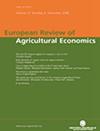Assessing the impact of payments for environmental services on a bioeconomic supply chain equilibrium
IF 3.5
2区 经济学
Q2 AGRICULTURAL ECONOMICS & POLICY
引用次数: 0
Abstract
This study evaluates the effectiveness of Payments for Environmental Services (PES) in mitigating both climate change and biodiversity loss within bioeconomic supply chains. Employing a variational inequality approach within a multicriteria decision-making framework, complemented by numerical simulations using an optimized machine learning algorithm, we find that reductions of approximately 50 per cent in greenhouse gas emissions and biodiversity loss are attainable. However, PES alone are insufficient to achieve these targets. A comprehensive strategy—combining a moderate reduction in production through economic decoupling, increased environmental awareness, and targeted incentives—is necessary for meaningful reductions. Our findings also indicate that supply chain participants collectively forgo 11.36 per cent of their profits when internalizing environmental externalities. Meanwhile, consumers are willing to pay only a 4.04 per cent premium for sustainable products, implying that a significant portion of these costs cannot simply be transferred to consumers. Consequently, firms must invest in greener production methods and abatement technologies to sustain profit margins while mitigating environmental impacts.评估环境服务支付对生物经济供应链平衡的影响
本研究评估了环境服务支付(PES)在缓解生物经济供应链中气候变化和生物多样性丧失方面的有效性。在多标准决策框架中采用变分不等式方法,辅以使用优化机器学习算法的数值模拟,我们发现温室气体排放和生物多样性损失减少约50%是可以实现的。然而,仅靠PES不足以实现这些目标。全面的战略——通过经济脱钩、提高环保意识和有针对性的激励措施来适度减少产量——对于有意义的减排是必要的。我们的研究结果还表明,供应链参与者在内部化环境外部性时,总共放弃了11.36%的利润。与此同时,消费者只愿意为可持续产品支付4.04%的溢价,这意味着这些成本的很大一部分不能简单地转嫁给消费者。因此,企业必须投资于更环保的生产方法和减排技术,以维持利润率,同时减轻对环境的影响。
本文章由计算机程序翻译,如有差异,请以英文原文为准。
求助全文
约1分钟内获得全文
求助全文
来源期刊

European Review of Agricultural Economics
管理科学-农业经济与政策
CiteScore
6.60
自引率
5.90%
发文量
25
审稿时长
>24 weeks
期刊介绍:
The European Review of Agricultural Economics serves as a forum for innovative theoretical and applied agricultural economics research.
The ERAE strives for balanced coverage of economic issues within the broad subject matter of agricultural and food production, consumption and trade, rural development, and resource use and conservation. Topics of specific interest include multiple roles of agriculture; trade and development; industrial organisation of the food sector; institutional dynamics; consumer behaviour; sustainable resource use; bioenergy; agricultural, agri-environmental and rural policy; specific European issues.
Methodological articles are welcome. All published papers are at least double peer reviewed and must show originality and innovation. The ERAE also publishes book reviews.
 求助内容:
求助内容: 应助结果提醒方式:
应助结果提醒方式:


